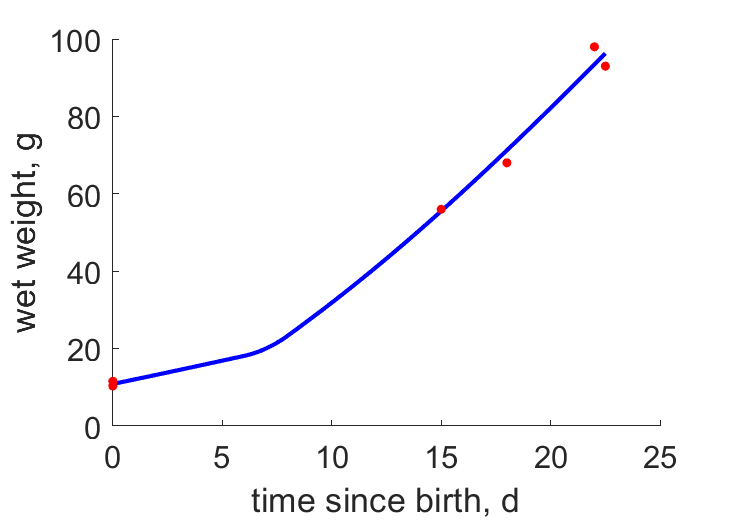Predictions & Data for this entry
| Model: std | climate: ET | migrate: Ml | phylum: |
| COMPLETE = 2.5 | ecozone: TH | food: biCi | class: |
| MRE = 0.065 | habitat: 0iTg, 0iTh, 0iFm | gender: Dg | order: |
| SMSE = 0.007 | embryo: Tnsfm | reprod: O | family: |
Zero-variate data
| Data | Observed | Predicted | (RE) | Unit | Description | Reference |
|---|---|---|---|---|---|---|
| ab | 21.9 | 19.31 | (0.1185) | d | age at birth | avibase |
| tx | 22 | 21.88 | (0.005326) | d | time since birth at fledging | Nett2020 |
| tp | 66 | 79.15 | (0.1992) | d | time since birth at puberty | guess |
| tR | 730 | 730 | ( 0) | d | time since birth at 1st brood | avibase |
| am | 8687 | 9461 | (0.08913) | d | life span | avibase |
| Ww0 | 17.9 | 19.03 | (0.06339) | g | initial wet weight | avibase |
| Wwb | 11.5 | 12.54 | (0.09037) | g | wet weight at birth | Nett2020 |
| Wwi | 113 | 102.5 | (0.09303) | g | ultimate wet weight | avibase |
| Wwim | 108 | 109.4 | (0.01325) | g | ultimate wet weight of male | avibase |
| Ri | 0.01096 | 0.01137 | (0.03723) | #/d | maximum reprod rate | avibase |
Uni- and bivariate data
| Data | Figure | Independent variable | Dependent variable | (RE) | Reference |
|---|---|---|---|---|---|
| tW |  | time since birth | wet weight | (0.03789) | Nett2020 |
Pseudo-data at Tref = 20°C
| Data | Generalised animal | Arenaria interpres | Unit | Description |
|---|---|---|---|---|
| v | 0.02 | 0.03491 | cm/d | energy conductance |
| p_M | 18 | 1069 | J/d.cm^3 | vol-spec som maint |
| k_J | 0.002 | 0.04167 | 1/d | maturity maint rate coefficient |
| k | 0.3 | 0.2851 | - | maintenance ratio |
| kap | 0.8 | 0.7213 | - | allocation fraction to soma |
| kap_G | 0.8 | 0.8011 | - | growth efficiency |
| kap_R | 0.95 | 0.95 | - | reproduction efficiency |
Discussion
- Males are assumed to differ from females by {p_Am} only
- mod_1: Pseudo-data point k is used, rather than k_J; Data set tp and parameter t_R are added, the latter replacing clutch interval t_N. Postnatal T is based on PrinPres1991, see get_T_Aves. See further the revision page, theme puberty
Bibliography